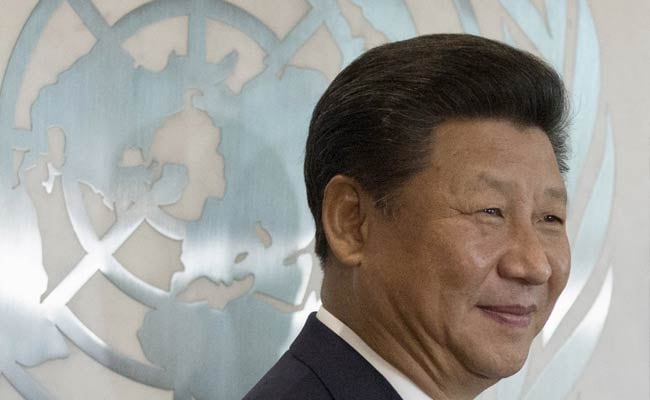
Chinese President Xi Jinping
New York:
China will contribute 8,000 troops for a United Nations peacekeeping standby force, China's President Xi Jinping told the United Nations General Assembly on Monday, a move that could make it one of the largest players in UN peacekeeping efforts.
He also said China would provide $100 million in military assistance to the African Union in the next five years to support the establishment of an African standby force and to boost its capacity for crisis response. He did not give further details.
President Xi's pledge comes as China is trying to show it is a responsible international player amid concern over its growing military might and territorial disputes in the Asia-Pacific region.
During a state visit to Washington on Friday, President Xi agreed with US President Barack Obama that both countries would increase their "robust" peacekeeping commitments.
They are among some 50 world leaders, more than a third from Europe, who are set to pledge thousands of troops and police, equipment or training for UN peacekeeping missions during the UN summit today being chaired by Mr Obama.
"China will join the new UN peacekeeping capability readiness system, and has thus decided to lead in setting up a permanent peacekeeping police squad and build a peacekeeping standby force of 8,000 troops," President Xi said.
The US military told dozens of UN ambassadors and military advisors in New York in July that the UN needed rapid response forces, equipment and training.
The United States pays more than 28 per cent of the $8.2 billion UN peacekeeping budget, but Beijing says that it contributes more personnel to peacekeeping missions than each of the other four permanent members of the UN Security Council: the United States, Russia, France and the United Kingdom.
China now provides around 3,000 of the more than 106,500 UN troops, police and advisers deployed by all countries, according to August data from the UN website, making it the ninth biggest contributor of peacekeeping personnel.
Its largest contingent is in South Sudan, where it is has played a growing diplomatic role and is a major investor in the oil industry.
Experts have noted that China's expanding peacekeeping role in recent years parallels its desire to expand its military's capabilities farther abroad and could provide valuable logistical and operational experience.
President Xi tried to allay concerns that his country's growing influence was a threat.
"We are committed to peaceful development. No matter how the international landscape may evolve and how strong China may become, China will never pursue hegemony, expansion, or sphere of influence," President Xi said.
He also said China would provide $100 million in military assistance to the African Union in the next five years to support the establishment of an African standby force and to boost its capacity for crisis response. He did not give further details.
President Xi's pledge comes as China is trying to show it is a responsible international player amid concern over its growing military might and territorial disputes in the Asia-Pacific region.
During a state visit to Washington on Friday, President Xi agreed with US President Barack Obama that both countries would increase their "robust" peacekeeping commitments.
They are among some 50 world leaders, more than a third from Europe, who are set to pledge thousands of troops and police, equipment or training for UN peacekeeping missions during the UN summit today being chaired by Mr Obama.
"China will join the new UN peacekeeping capability readiness system, and has thus decided to lead in setting up a permanent peacekeeping police squad and build a peacekeeping standby force of 8,000 troops," President Xi said.
The US military told dozens of UN ambassadors and military advisors in New York in July that the UN needed rapid response forces, equipment and training.
The United States pays more than 28 per cent of the $8.2 billion UN peacekeeping budget, but Beijing says that it contributes more personnel to peacekeeping missions than each of the other four permanent members of the UN Security Council: the United States, Russia, France and the United Kingdom.
China now provides around 3,000 of the more than 106,500 UN troops, police and advisers deployed by all countries, according to August data from the UN website, making it the ninth biggest contributor of peacekeeping personnel.
Its largest contingent is in South Sudan, where it is has played a growing diplomatic role and is a major investor in the oil industry.
Experts have noted that China's expanding peacekeeping role in recent years parallels its desire to expand its military's capabilities farther abroad and could provide valuable logistical and operational experience.
President Xi tried to allay concerns that his country's growing influence was a threat.
"We are committed to peaceful development. No matter how the international landscape may evolve and how strong China may become, China will never pursue hegemony, expansion, or sphere of influence," President Xi said.
© Thomson Reuters 2015
Track Latest News Live on NDTV.com and get news updates from India and around the world

